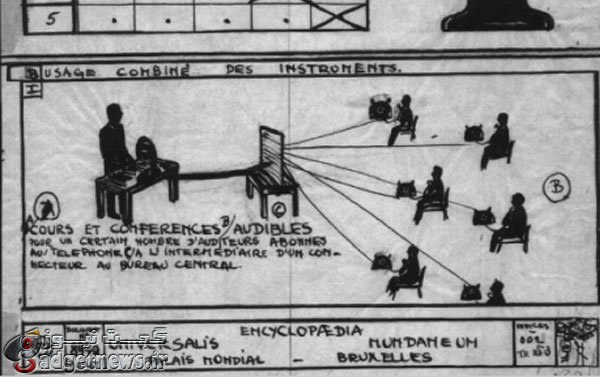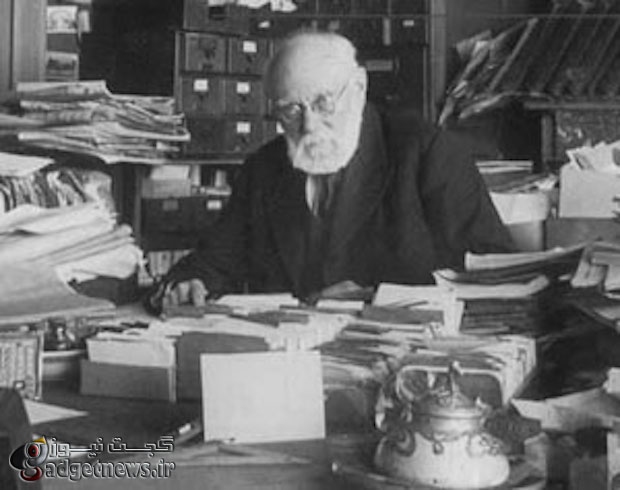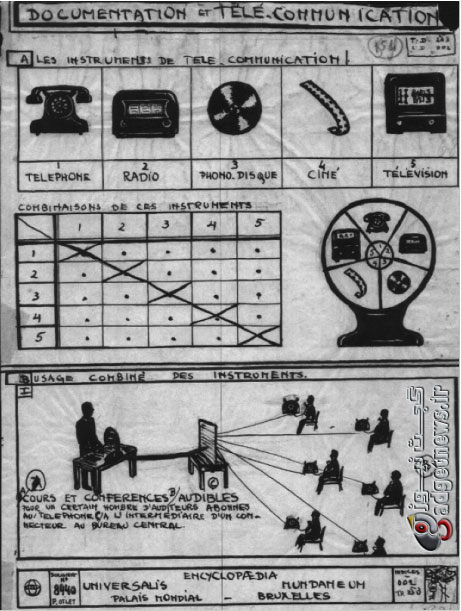
افرادی حتی قبل از شروع قرن ۲۰ مشغول اختراع راه هایی برای ذخیره و بازیابی اطلاعات بوده اند. پاول اوتله (Paul Otlet) یکی از آنها بوده.بله اين نابغه بلژيکي ، طرح مفهومي اينترنت را 100 سال پيش ترسيم کرده بود!در ادامه با گجت نيوز همراه باشيد.
این نابغه بلژیکی، در سال ۱۸۹۵ ایده “کتابخانه های جهانی” را منتشر کرد که در آن هر کسی می توانست به تعداد زیادی کتاب دسترس پیدا کند. تا ۱۹۳۴ او ایده خود را بهینه کرد و نام “تلسکوپ های الکترونیک” را بر آن گذاشت، چیزی که می توانست مردم را به کتاب و فیلم و صوت و عکس متصل کند.

| با حمله نازی ها به بلژیک آینده از نظر اوتله تیره و تار شد. |
با اینکه امروزه این ایده در سر هر کسی عادی جلوه می کند اما بیش از ۱ قرن قبل، معدود افرادی خلاقیت ایده پردازی آن را داشتند. اوتله به گروهی از متفکرین پیشتاز مثل هنری لافونتن و نابغه معماری لو کوربوزیه پیوسته بود تا آرشیوی جهانی برای روزنامه ها بسازد و هر چند آن ایده ها راهی به دنیای واقعی نیافتند، اما در مقطعی این گروه یک سرویس تعاملی برای ارسال پرسش و دریافت پاسخ از طریق تلگراف (با هزینه مشخص) ساختند.

هدف نهایی اوتله ساختن سیستمی بود که با آن هر کسی می توانست متن را “از راه دور” بخواند، آن را تغییر اندازه دهد و روی صفحه های شخصی مشاهده کند (عکس بالا). این بینش بلند در واقع همان اینترنت مدرن بود، چیزی که حتی ونیور بوش هم آمدنش را حدس نمی زد. متاسفانه با حمله نازی ها به بلژیک در سال ۱۹۴۰، چشم انداز دور اندیشانه اوتله نیز از بین رفت و آینده در نظرش تیره و تار شد. او ۴ سال بعد درگذشت، اما خوشبختانه تاریخ او را فراموش نکرده واعتبار برخی از آن ایده ها متعلق به او است.
منبع : engadget
Though we’re pretty sure that time travelers don’t exist, people were working on hypertext — used by web browsers to retrieve connected information — long before computers. It even predates the ideas of a certain Vannevar Bush, the man generally acknowledged as having laid the groundwork for hypertext by microfiche in a seminal 1945 article. Nope, according to the Atlantic, some people were pondering ways of storing and retrieving information prior even to the 20th century. A Belgian genius called Paul Otlet posited an idea in 1895 about “universal libraries” to give anyone access to a vast number of books. By 1934 he had refined it to “electronic telescopes” that would connect people instantly to books, films, audio recordings and photos.
We take that for granted nowadays, of course, but few were considering such ideas back then. Otlet joined forces with radical thinkers like Nobel prize winner Henry LaFontaine and architectural genius Le Courbusier to design a global newspaper archive, networked associations and a 150-room museum. Though those ideas remained a pipe dream, at one point they actually provided a service where you could submit a question and get an answer by telegraph (for a fee). Otlet’s ultimate goal was a system where “from a distance, everyone will be able to read text, enlarged and limited to the desired subject, projected on an individual screen.” That foreshadowed the modern internet, something even Vannevar Bush never saw coming. Unfortunately, Otlet’s vision was shattered by the Nazi invasion of Belgium in 1940, and he died soon after. Luckily, he’s now getting some credit for those ideas, and his fascinating story is worth a longer read.
 گجت نیوز آخرین اخبار گجتی و فناوری های روز دنیا
گجت نیوز آخرین اخبار گجتی و فناوری های روز دنیا 





